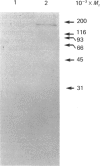Abstract
Rabbit alveolar macrophages express a plasma-membrane receptor that recognizes glycoprotein ligands bearing terminal mannose, fucose or N-acetylglucosamine residues. Macrophage membranes were washed extensively with buffers containing high salt and mannose or EDTA to remove endogenously bound ligand, before Triton X-100 extraction. The extracts were chromatographed on mannose-Sepharose. Elution with mannose, followed by dialysis and a second mannose-Sepharose step with EDTA elution, produced a preparation that migrated as single protein band of Mr 175,000 on SDS/polyacrylamide-gel electrophoresis. The purified protein binds mannose-BSA (bovine serum albumin) with a dissociation constant of 1.9 X 10(-8) M. Ligand binding is Ca2+ and pH-dependent, with maximal binding at neutral pH and low binding below pH 6.0. The binding of 125I-mannose-BSA is inhibited by ligands bearing high-mannose oligosaccharides, such as mannan or beta-glucuronidase, as well as the monosaccharides mannose, fucose and N-acetylglucosamine. Galactose, galactosylated BSA, glucose and mannose 6-phosphate are non-inhibitory. Amino acid compositional analyses indicate that the receptor contains high concentrations of aspartate/asparagine and glutamate/glutamine, and low amounts of methionine. The carbohydrate composition was studied by lectin overlays of electrophoretically transferred receptor, and the results indicate the presence of N-linked complex and O-linked sialylated oligosaccharides. A protein of Mr 175,000 was immunoprecipitated from radio-iodinated macrophage membranes with an antibody generated against purified rabbit lung mannose receptor.
Full text
PDF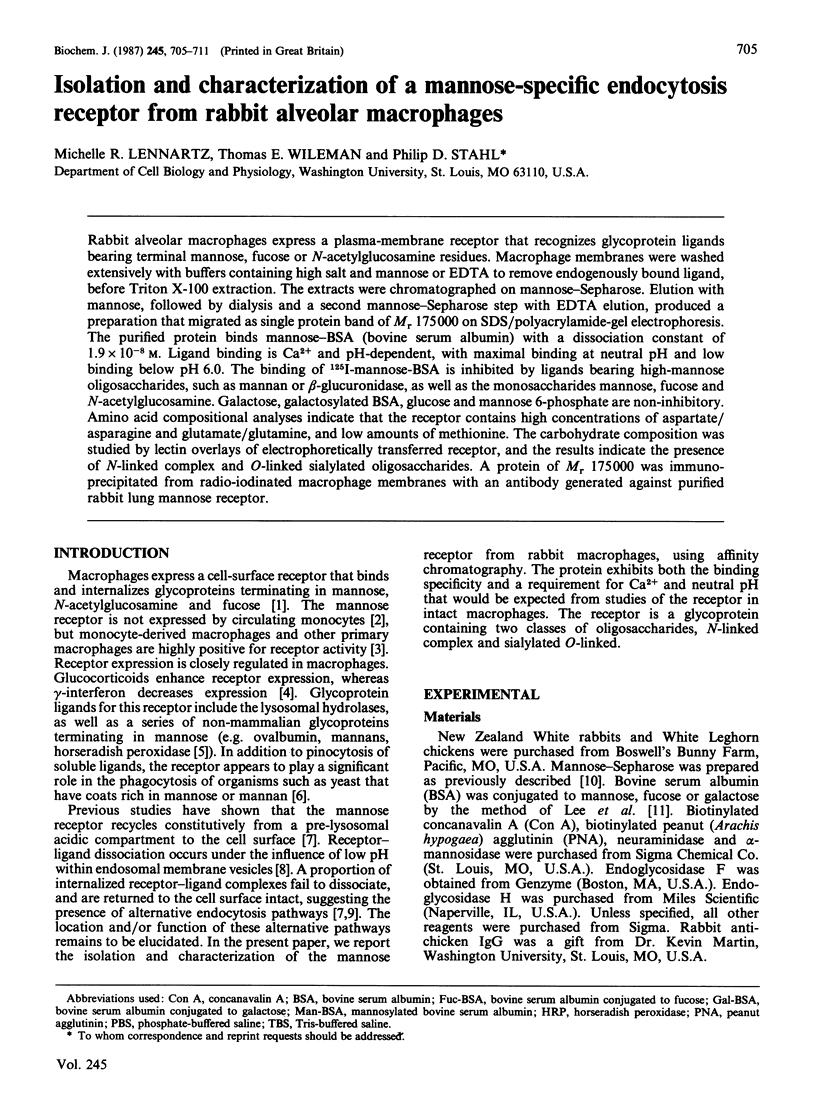
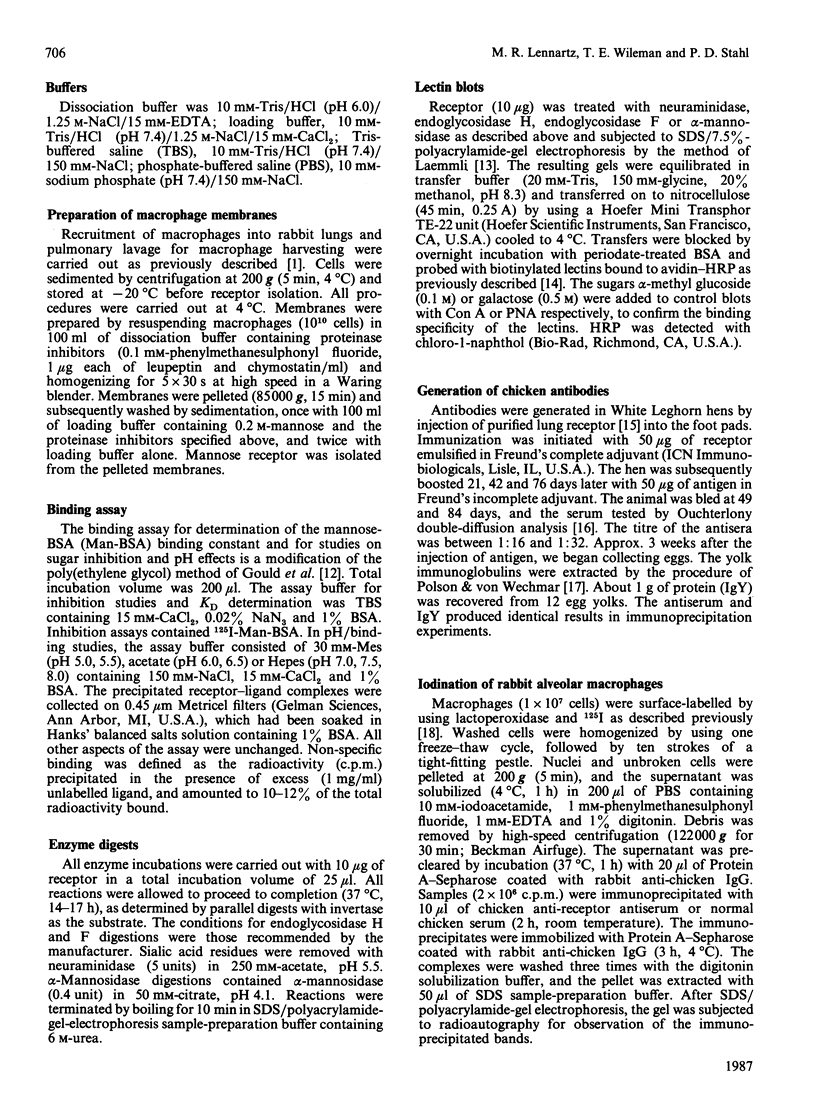
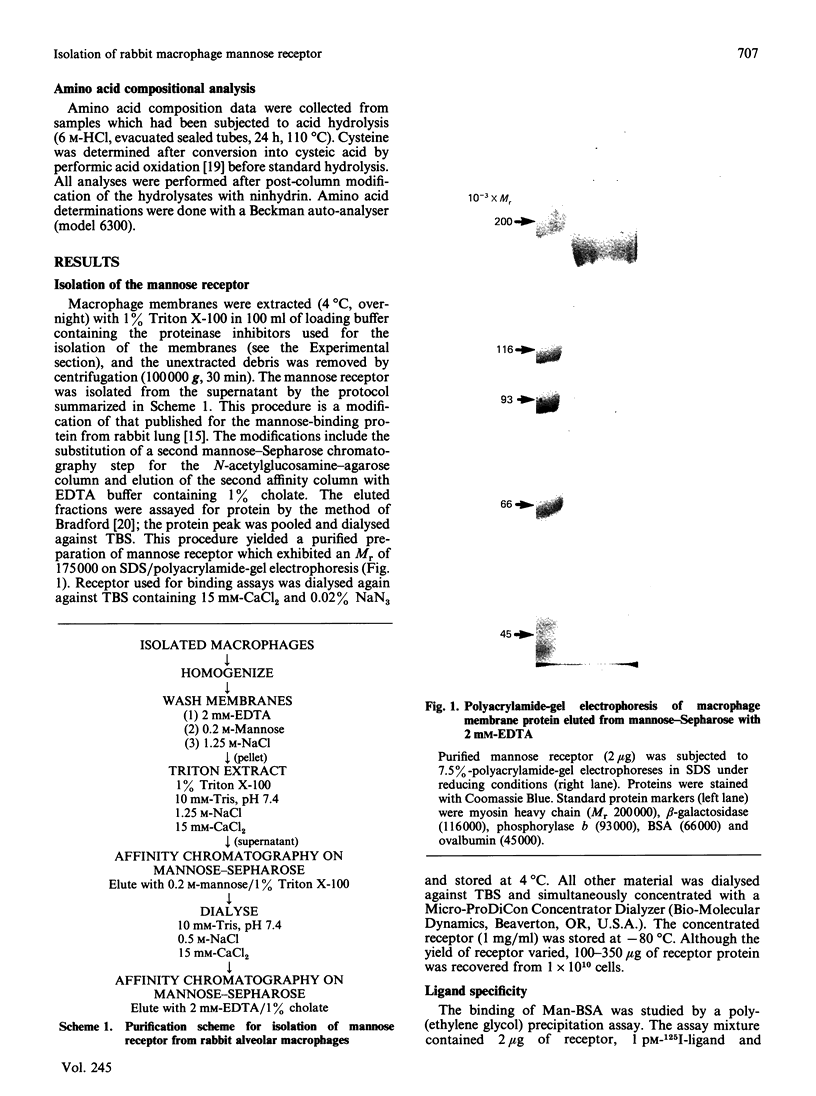
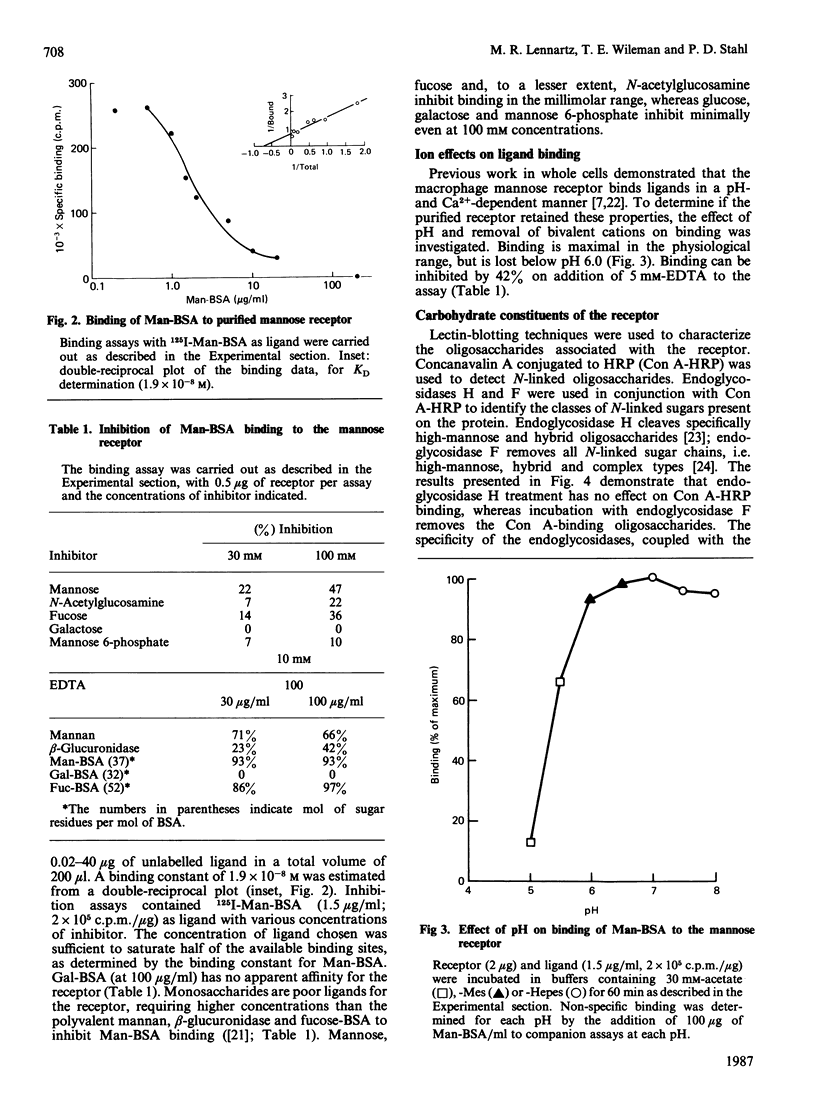
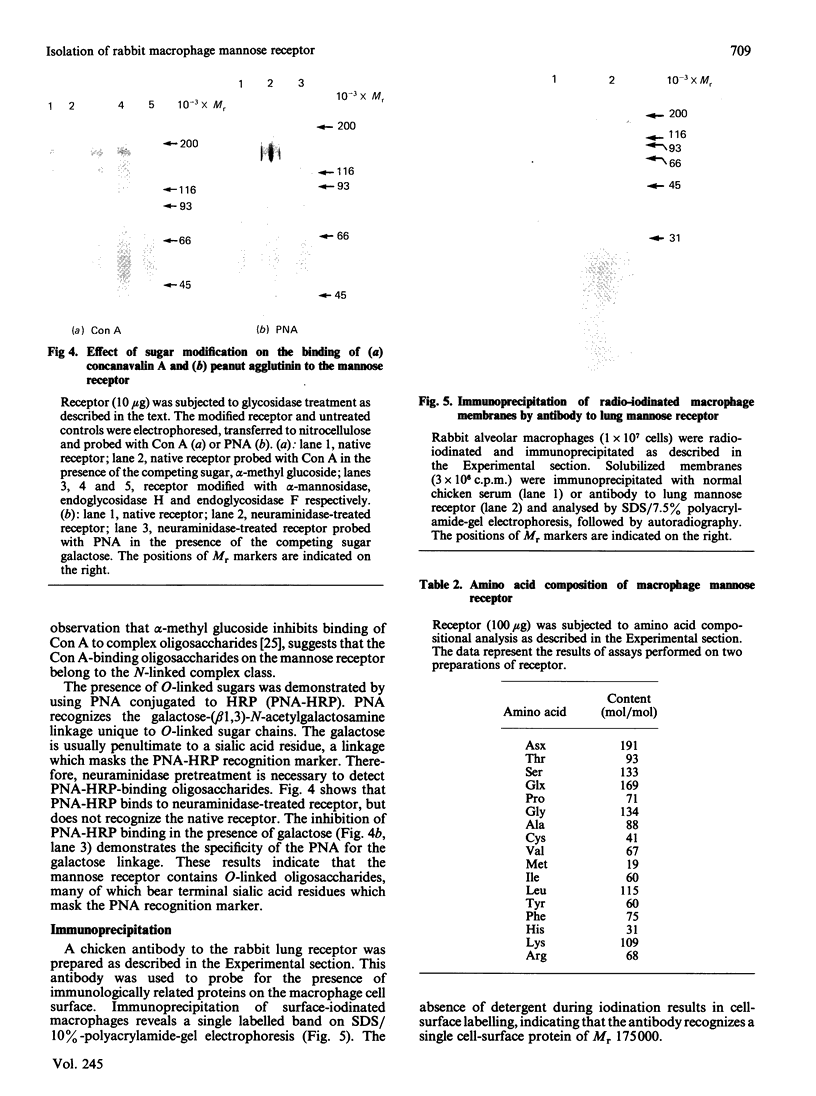
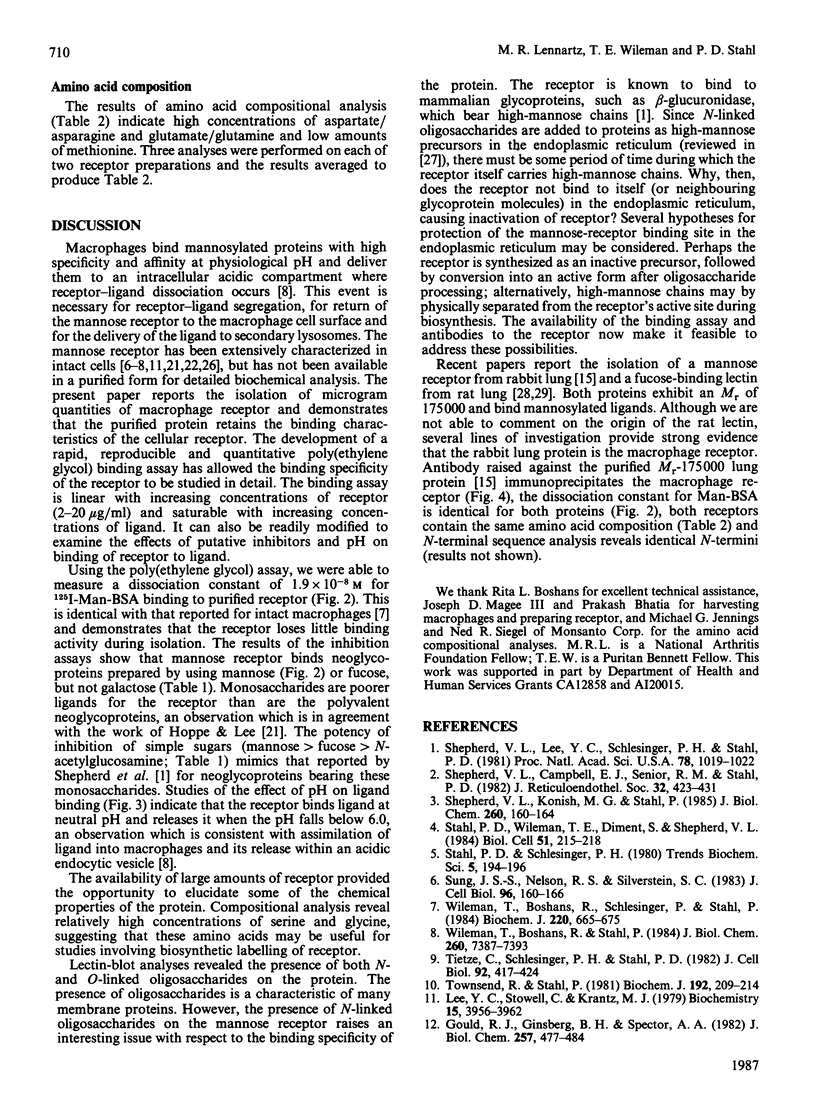
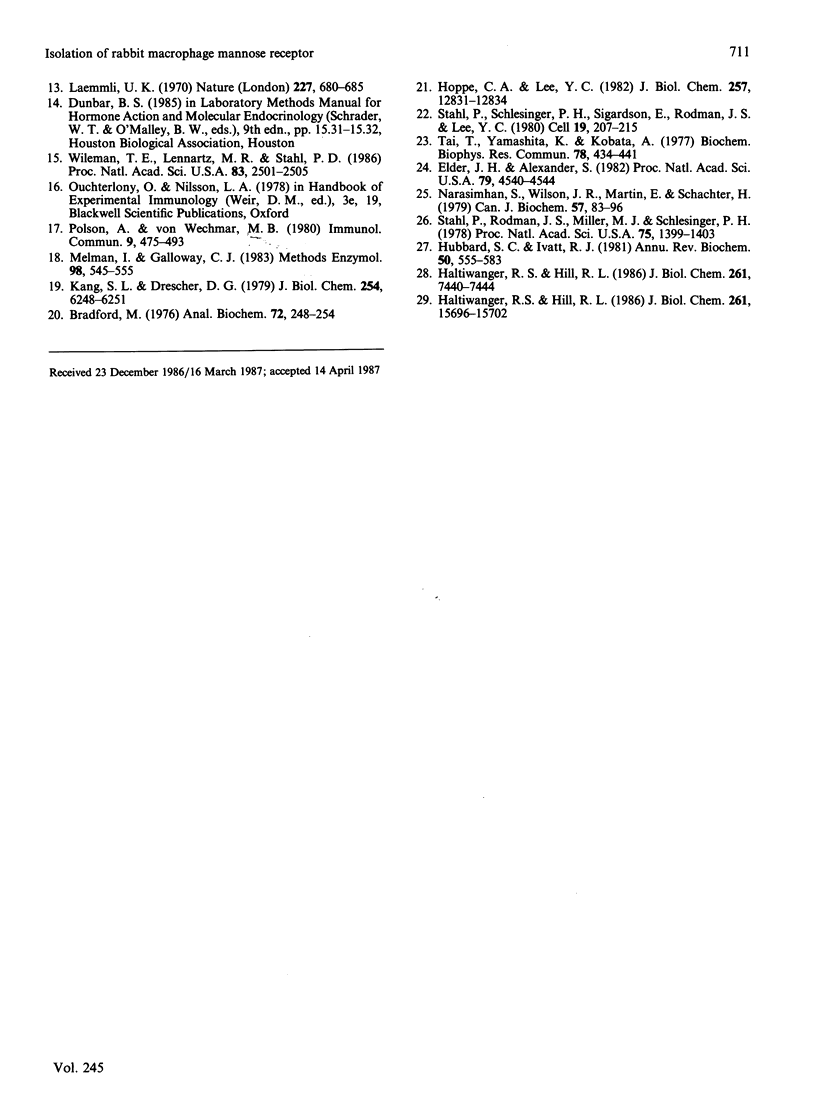
Images in this article
Selected References
These references are in PubMed. This may not be the complete list of references from this article.
- Bradford M. M. A rapid and sensitive method for the quantitation of microgram quantities of protein utilizing the principle of protein-dye binding. Anal Biochem. 1976 May 7;72:248–254. doi: 10.1016/0003-2697(76)90527-3. [DOI] [PubMed] [Google Scholar]
- Elder J. H., Alexander S. endo-beta-N-acetylglucosaminidase F: endoglycosidase from Flavobacterium meningosepticum that cleaves both high-mannose and complex glycoproteins. Proc Natl Acad Sci U S A. 1982 Aug;79(15):4540–4544. doi: 10.1073/pnas.79.15.4540. [DOI] [PMC free article] [PubMed] [Google Scholar]
- Gould R. J., Ginsberg B. H., Spector A. A. Lipid effects on the binding properties of a reconstituted insulin receptor. J Biol Chem. 1982 Jan 10;257(1):477–484. [PubMed] [Google Scholar]
- Haltiwanger R. S., Hill R. L. The isolation of a rat alveolar macrophage lectin. J Biol Chem. 1986 Jun 5;261(16):7440–7444. [PubMed] [Google Scholar]
- Haltiwanger R. S., Hill R. L. The ligand binding specificity and tissue localization of a rat alveolar macrophage lectin. J Biol Chem. 1986 Nov 25;261(33):15696–15702. [PubMed] [Google Scholar]
- Hoppe C. A., Lee Y. C. Stimulation of mannose-binding activity in the rabbit alveolar macrophage by simple sugars. J Biol Chem. 1982 Nov 10;257(21):12831–12834. [PubMed] [Google Scholar]
- Hubbard S. C., Ivatt R. J. Synthesis and processing of asparagine-linked oligosaccharides. Annu Rev Biochem. 1981;50:555–583. doi: 10.1146/annurev.bi.50.070181.003011. [DOI] [PubMed] [Google Scholar]
- Laemmli U. K. Cleavage of structural proteins during the assembly of the head of bacteriophage T4. Nature. 1970 Aug 15;227(5259):680–685. doi: 10.1038/227680a0. [DOI] [PubMed] [Google Scholar]
- Lee K. S., Drescher D. G. Derivatization of cysteine and cystine for fluorescence amino acid analysis with the o-phthaldialdehyde/2-mercaptoethanol reagent. J Biol Chem. 1979 Jul 25;254(14):6248–6251. [PubMed] [Google Scholar]
- Lee Y. C., Stowell C. P., Krantz M. J. 2-Imino-2-methoxyethyl 1-thioglycosides: new reagents for attaching sugars to proteins. Biochemistry. 1976 Sep 7;15(18):3956–3963. doi: 10.1021/bi00663a008. [DOI] [PubMed] [Google Scholar]
- Mellman I., Galloway C. J. Selective labeling and quantitative analysis of internalized plasma membrane. Methods Enzymol. 1983;98:545–555. doi: 10.1016/0076-6879(83)98181-8. [DOI] [PubMed] [Google Scholar]
- Narasimhan S., Wilson J. R., Martin E., Schachter H. A structural basis for four distinct elution profiles on concanavalin A--Sepharose affinity chromatography of glycopeptides. Can J Biochem. 1979 Jan;57(1):83–96. doi: 10.1139/o79-011. [DOI] [PubMed] [Google Scholar]
- Polson A., von Wechmar M. B., van Regenmortel M. H. Isolation of viral IgY antibodies from yolks of immunized hens. Immunol Commun. 1980;9(5):475–493. doi: 10.3109/08820138009066010. [DOI] [PubMed] [Google Scholar]
- Shepherd V. L., Campbell E. J., Senior R. M., Stahl P. D. Characterization of the mannose/fucose receptor on human mononuclear phagocytes. J Reticuloendothel Soc. 1982 Dec;32(6):423–431. [PubMed] [Google Scholar]
- Shepherd V. L., Konish M. G., Stahl P. Dexamethasone increases expression of mannose receptors and decreases extracellular lysosomal enzyme accumulation in macrophages. J Biol Chem. 1985 Jan 10;260(1):160–164. [PubMed] [Google Scholar]
- Shepherd V. L., Lee Y. C., Schlesinger P. H., Stahl P. D. L-Fucose-terminated glycoconjugates are recognized by pinocytosis receptors on macrophages. Proc Natl Acad Sci U S A. 1981 Feb;78(2):1019–1022. doi: 10.1073/pnas.78.2.1019. [DOI] [PMC free article] [PubMed] [Google Scholar]
- Stahl P. D., Rodman J. S., Miller M. J., Schlesinger P. H. Evidence for receptor-mediated binding of glycoproteins, glycoconjugates, and lysosomal glycosidases by alveolar macrophages. Proc Natl Acad Sci U S A. 1978 Mar;75(3):1399–1403. doi: 10.1073/pnas.75.3.1399. [DOI] [PMC free article] [PubMed] [Google Scholar]
- Stahl P. D., Wileman T. E., Diment S., Shepherd V. L. Mannose-specific oligosaccharide recognition by mononuclear phagocytes. Biol Cell. 1984;51(2):215–218. doi: 10.1111/j.1768-322x.1984.tb00301.x. [DOI] [PubMed] [Google Scholar]
- Stahl P., Schlesinger P. H., Sigardson E., Rodman J. S., Lee Y. C. Receptor-mediated pinocytosis of mannose glycoconjugates by macrophages: characterization and evidence for receptor recycling. Cell. 1980 Jan;19(1):207–215. doi: 10.1016/0092-8674(80)90402-x. [DOI] [PubMed] [Google Scholar]
- Sung S. S., Nelson R. S., Silverstein S. C. Yeast mannans inhibit binding and phagocytosis of zymosan by mouse peritoneal macrophages. J Cell Biol. 1983 Jan;96(1):160–166. doi: 10.1083/jcb.96.1.160. [DOI] [PMC free article] [PubMed] [Google Scholar]
- Tietze C., Schlesinger P., Stahl P. Mannose-specific endocytosis receptor of alveolar macrophages: demonstration of two functionally distinct intracellular pools of receptor and their roles in receptor recycling. J Cell Biol. 1982 Feb;92(2):417–424. doi: 10.1083/jcb.92.2.417. [DOI] [PMC free article] [PubMed] [Google Scholar]
- Townsend R., Stahl P. Isolation and characterization of a mannose/N-acetylglucosamine/fucose-binding protein from rat liver. Biochem J. 1981 Jan 15;194(1):209–214. doi: 10.1042/bj1940209. [DOI] [PMC free article] [PubMed] [Google Scholar]
- Wileman T. E., Lennartz M. R., Stahl P. D. Identification of the macrophage mannose receptor as a 175-kDa membrane protein. Proc Natl Acad Sci U S A. 1986 Apr;83(8):2501–2505. doi: 10.1073/pnas.83.8.2501. [DOI] [PMC free article] [PubMed] [Google Scholar]
- Wileman T., Boshans R. L., Schlesinger P., Stahl P. Monensin inhibits recycling of macrophage mannose-glycoprotein receptors and ligand delivery to lysosomes. Biochem J. 1984 Jun 15;220(3):665–675. doi: 10.1042/bj2200665. [DOI] [PMC free article] [PubMed] [Google Scholar]
- Wileman T., Boshans R., Stahl P. Uptake and transport of mannosylated ligands by alveolar macrophages. Studies on ATP-dependent receptor-ligand dissociation. J Biol Chem. 1985 Jun 25;260(12):7387–7393. [PubMed] [Google Scholar]





